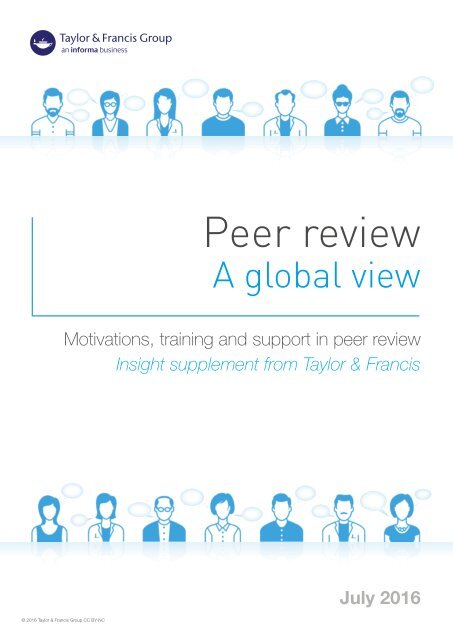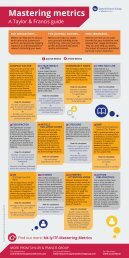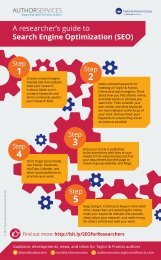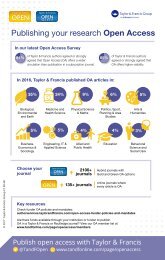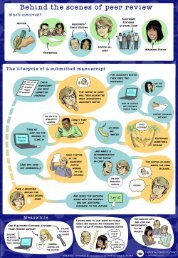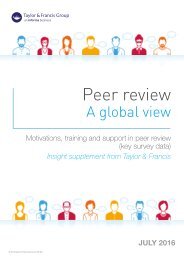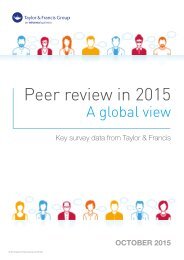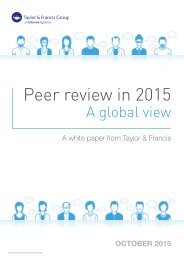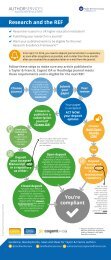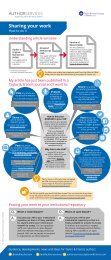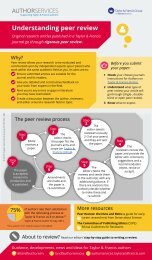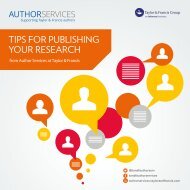Motivations and support
Peer review in 2015 supplement
Peer review in 2015 supplement
Create successful ePaper yourself
Turn your PDF publications into a flip-book with our unique Google optimized e-Paper software.
Peer review<br />
A global view<br />
<strong>Motivations</strong>, training <strong>and</strong> <strong>support</strong> in peer review<br />
Insight supplement from Taylor & Francis<br />
July 2016<br />
© 2016 Taylor & Francis Group CC BY-NC
Contents<br />
1 Introduction .................................................................................................. 3<br />
Introduction<br />
In 2015, Taylor & Francis asked researchers from around the world to<br />
take part in an online survey <strong>and</strong> a series of focus groups, which aimed to<br />
explore what the experience of peer review was like for those involved in it<br />
on a regular basis: for the authors who write the papers, for the reviewers<br />
who review them, <strong>and</strong> for the journal editors who oversee the process.<br />
2 Key findings .................................................................................................. 3<br />
3 Research methodology, responses <strong>and</strong><br />
survey notes.................................................................................................. 4<br />
4 The right thing to do? ........................................................................... 6<br />
5 What incentivizes people to review? ........................................ 9<br />
6 From reviewee to reviewer: training<br />
<strong>and</strong> <strong>support</strong> ............................................................................................... 11<br />
7 Locating reviewers .............................................................................. 15<br />
8 Conclusion ................................................................................................... 16<br />
The first set of findings was published as ‘Peer review in<br />
2015: a global view’. It covered respondents’ opinions on<br />
the purpose of peer review (expectation versus reality),<br />
the process <strong>and</strong> its mechanics, the place <strong>and</strong> experience<br />
of ethics in peer review, <strong>and</strong> different models of review.<br />
But what motivates researchers to be a reviewer? How<br />
do you become a reviewer for a journal? And what<br />
<strong>support</strong> would researchers like when they review a<br />
paper (or even before they accept that first invitation)?<br />
This latest set of findings brings together the data on<br />
2 Key findings<br />
1. Making a contribution to the field <strong>and</strong> sharing results<br />
are the most important motivations for submitting to<br />
peer-reviewed journals.<br />
2. Most reviewers had reviewed up to 50 academic<br />
papers to date, with 46% of STM researchers<br />
reviewing between 10 <strong>and</strong> 50, <strong>and</strong> 49% of HSS<br />
researchers doing the same.<br />
3. Playing their part as a member of the academic<br />
community, reciprocating the benefit, <strong>and</strong> improving<br />
papers are the most important reasons for agreeing<br />
to peer review in both STM <strong>and</strong> HSS.<br />
4. Most people received their first invitation to<br />
review through the journal editor or an editorial<br />
board member.<br />
why researchers review, how reviewers are selected,<br />
<strong>and</strong> what <strong>support</strong> <strong>and</strong> guidance all those involved in the<br />
process would like to see in place to ensure effective<br />
peer review for journal articles.<br />
With data segmented by humanities <strong>and</strong> social sciences<br />
(HSS) <strong>and</strong> science, technology <strong>and</strong> medicine (STM),<br />
the responses reveal a consistency in experience <strong>and</strong><br />
viewpoints across disciplines, <strong>and</strong> address some of<br />
the major issues currently being discussed within the<br />
scholarly community.<br />
5. The factor that would incentivise people most to<br />
review is receiving free access to the journal.<br />
6. Over two thirds of authors who have never peer<br />
reviewed would like to.<br />
7. Yet 60% of editors have difficulty in finding qualified<br />
reviewers.<br />
8. 64% of authors in HSS <strong>and</strong> 63% in STM who are yet<br />
to review a paper would like formal training.<br />
9. 66% of reviewers in HSS <strong>and</strong> 64% in STM rate their<br />
confidence in reviewing a paper as 8 or above out<br />
of 10.<br />
10. Editorial board members (HSS) <strong>and</strong> Web of Science<br />
(STM) are the most used means of finding reviewers.<br />
2<br />
PEER REVIEW A GLOBAL VIEW<br />
INTRODUCTION & KEY FINDINGS<br />
3
3<br />
Research methodology, responses<br />
<strong>and</strong> survey notes<br />
The research comprised of an online survey, a series<br />
of focus groups (so that views could be explored in<br />
depth), <strong>and</strong> desk research to identify relevant previous<br />
studies, articles, reports <strong>and</strong> blog posts. All focus<br />
group participants <strong>and</strong> survey respondents have been<br />
anonymized in this supplement.<br />
Qualitative research<br />
Six focus groups took place in the UK, China <strong>and</strong> South<br />
Africa in early 2015. Authors, reviewers <strong>and</strong> editors<br />
who had had a minimum of two journal articles peer<br />
reviewed (whether with Taylor & Francis or any other<br />
publisher) took part, spanning the sciences, technology,<br />
medicine, social sciences, <strong>and</strong> humanities. In total, there<br />
were 46 attendees.<br />
Quantitative research<br />
The survey responses are from researchers who have<br />
published in Taylor & Francis or Routledge journals.<br />
We contacted researchers who published with Taylor<br />
& Francis in 2013, many of whom would have since<br />
published elsewhere, reflecting the diverse experience<br />
of today’s research community. Their responses were<br />
then compared to a smaller sample of researchers<br />
from lists provided by Thomson Reuters, to ensure the<br />
results were truly representative.<br />
TOTAL RESPONDENTS: 7,438<br />
(a response rate of 8.6%)<br />
Examining views from Science,<br />
Technology <strong>and</strong> Medicine, <strong>and</strong> Humanities<br />
<strong>and</strong> Social Sciences<br />
A r<strong>and</strong>omised sample of all Taylor & Francis authors<br />
would currently be biased towards HSS. However, the<br />
true global population of researchers is heavily weighted<br />
in favour of STM (with STM researchers comprising<br />
nearly 9 in 10 of all researchers).*<br />
For this research, Taylor & Francis authors were<br />
stratified into STM <strong>and</strong> HSS spheres, <strong>and</strong> an equal<br />
number of authors were r<strong>and</strong>omly sampled from both<br />
strata.<br />
Combining the two samples in the online survey<br />
according to the STM / HSS global population* would<br />
essentially overwhelm the responses from HSS scholars<br />
with those from STM, <strong>and</strong> consequently we have<br />
reported these two sets of findings separately. Doing so<br />
also enables us to see the similarities <strong>and</strong> differences<br />
between these two groups.<br />
Responses on motivations <strong>and</strong> training<br />
In the online survey, respondents were asked a screening<br />
question based on their experience of authoring,<br />
reviewing <strong>and</strong> editing. Many of the responses here are<br />
from researchers who identified themselves as having<br />
reviewed <strong>and</strong> / or edited a journal, with a response rate<br />
for the section on motivation <strong>and</strong> training in peer review<br />
of 7.7% (or views from 6,311 researchers globally).<br />
Of those respondents, 62% were from the Humanities<br />
<strong>and</strong> Social Sciences (HSS) <strong>and</strong> 37% from Science,<br />
Technology <strong>and</strong> Medicine (STM) disciplines. Particularly<br />
in HSS, the largest group of respondents to this section<br />
were also from the USA (40%), suggesting a burden<br />
of weight to review falling on US-based scholars.<br />
This also reflects findings from a recent peer review<br />
study by Wiley, which found “US researchers bear a<br />
disproportionate burden of peer review” **.<br />
Top 6 countries with over 100 respondents<br />
Science, Technology<br />
<strong>and</strong> Medicine (STM)<br />
Humanities <strong>and</strong><br />
Social Sciences (HSS)<br />
STM Respondents HSS Respondents<br />
1. USA 488 1. USA 1575<br />
2. India 200 2. UK 383<br />
18% Author<br />
16% Author<br />
3. China 148 3. Australia 273<br />
4. Italy 145 4. Canada 208<br />
63% Reviewer & Author<br />
63% Reviewer & Author<br />
5. UK 113 5. Italy 108<br />
6. Canada 101 6. Germany 107<br />
18% Editor,<br />
Reviewer & Author<br />
21% Editor,<br />
Reviewer & Author<br />
* UNESCO World Social Science Report 2013<br />
** Warne, V. (2016) Rewarding reviewers – sense or sensibility? A Wiley study explained. Learned Publishing, 29: 41–50. doi: 10.1002/leap.1002.<br />
4 PEER REVIEW A GLOBAL VIEW<br />
RESEARCH METHODOLOGY, RESPONSES AND SURVEY NOTES 5
4<br />
The right thing to do?<br />
Continuing to value peer review<br />
Submitting to peer reviewed journals<br />
Researchers (answering as an author) were asked to<br />
rate which factors motivated them to submit research<br />
to a peer reviewed journal. Making a contribution to<br />
the field <strong>and</strong> sharing research findings with others were<br />
given as the most important motivations, with career<br />
enhancement <strong>and</strong> demonstrating that an original piece<br />
of research has been conducted close behind.<br />
Unsurprisingly, those under 40 scored career<br />
enhancement as their strongest motivation (at 8.5 for<br />
20-29 year olds <strong>and</strong> 8.6 for 30-39 year olds), while for<br />
those between 40 <strong>and</strong> 59 it was making a contribution<br />
to the field <strong>and</strong> sharing results, at 8.6 for each.<br />
Strongest motivation to submit to a peer reviewed journal<br />
Government or funding body pressure was the lowest<br />
motivator for submission: there is always more pressure<br />
from researchers’ institutions to fulfil a quota. The<br />
highest rating for the influence of government on the<br />
decision to publish in a peer reviewed journal though<br />
came from STM editors; who gave a mean score of 6.6<br />
out of 10.<br />
Government pressure is always higher in STM subjects<br />
than HSS subjects, <strong>and</strong> their role reflects the fact that<br />
they are likely to be the most experienced (<strong>and</strong> senior)<br />
of the three groups (author, reviewer <strong>and</strong> editor) <strong>and</strong><br />
therefore potentially the most aware of such external<br />
pressures. However, even amongst this group, all other<br />
factors were still rated more important.<br />
Mean scores, with respondents asked to rate out of 10, 1 being the lowest <strong>and</strong> 10 the highest<br />
How many academic papers have you<br />
reviewed?<br />
In STM, 69% of respondents had reviewed up to 50<br />
academic papers to date (with 23% selecting 0-10<br />
<strong>and</strong> 46% 10-50). In HSS this rose to 79%, with 30%<br />
selecting 0-10 <strong>and</strong> 49% 10-50). A significant portion<br />
in both groups had reviewed more than 100 papers<br />
(16% in STM <strong>and</strong> 10% in HSS), suggesting a career<br />
long contribution to the scholarly record (a third of all<br />
respondents placed themselves in the 50+<br />
age bracket).<br />
“It would be good to keep a track of<br />
papers submitted versus reviewed. It would<br />
seem unfair if someone was submitting lots<br />
<strong>and</strong> reviewing none – a kind of quid pro<br />
quo idea”<br />
Editor, Cultural Studies, UK<br />
Why review?<br />
Playing a part as a member of the academic community,<br />
reciprocating the benefit, <strong>and</strong> enjoying being able to<br />
help improve papers were selected as the top three<br />
motivations for agreeing to undertake peer review. In<br />
both STM <strong>and</strong> HSS there were scores for each of these<br />
reasons between 7.5 <strong>and</strong> 8.8 out of 10.<br />
Looking across the age groups, playing a part as a<br />
member of the academic community scored highest<br />
no matter what age bracket respondents fell into<br />
(between 8.4 <strong>and</strong> 8.7). Underst<strong>and</strong>ably, those between<br />
20–29 gave the highest score within ‘enhancing your<br />
reputation or furthering your career’ at 7.1. However,<br />
among this age group this was still placed fifth out of<br />
the eight possible responses, behind playing a part as<br />
a member of the academic community (1), enjoying<br />
being able to help improve papers (2), reciprocating<br />
the benefit (3), <strong>and</strong> enjoying seeing new work ahead of<br />
publication (4). According to the responses given here,<br />
attitudes among the age groups on motivations to peer<br />
review are closely aligned.<br />
This agrees with other large scale studies by the<br />
Publishing Research Consortium* <strong>and</strong> Sense about<br />
Science**, where over 90% of reviewers stated their<br />
top motivation for reviewing as playing their part in the<br />
academic community.<br />
In STM:<br />
In HSS:<br />
Authors 8.2<br />
Authors 8.6<br />
Editors 8.7 Reviewers 8.5 Editors 8.8<br />
Reviewers 8.7<br />
Sharing with others<br />
Making a contribution<br />
to the field<br />
“Among all the functions of peer review,<br />
I think the greatest benefit is that it increases<br />
academic communication. The second importance<br />
is that it ensures the scientific rigor of papers.<br />
As to the third one, I’m both an editor <strong>and</strong> a researcher<br />
in my field. I review other papers <strong>and</strong> have also been<br />
reviewed by others. I think reading other people’s<br />
papers inspires me … this is important <strong>and</strong> helpful.”<br />
Researcher, History, China<br />
“I stopped reviewing when I was busy but<br />
have come back as I feel I have something to<br />
add. Some of the quality of the feedback I was<br />
getting was very poor. Some only know one<br />
method <strong>and</strong> think everything should follow<br />
that method. It’s ok for me as I can argue my<br />
point but it worries me for younger authors,<br />
who may find this difficult to address.”<br />
Researcher, Business <strong>and</strong><br />
Economics, UK<br />
* Ware, M. The Publishing Research Consortium Peer Review Survey 2015<br />
** Peer Review Survey 2009: Full Report. Sense About Science<br />
6<br />
PEER REVIEW A GLOBAL VIEW<br />
THE EXECUTIVE RIGHT THING SUMMARY TO DO?<br />
7
What motivates people to peer review<br />
Mean scores (all scores are on a scale of 1–10, 1 being the lowest, 10 the highest)<br />
Play their part as a member<br />
of the academic community<br />
STM<br />
8.4<br />
Strongest<br />
motivations<br />
HSS<br />
8.8<br />
Play their part as a member<br />
of the academic community<br />
5 What incentivizes people to review?<br />
When asked to consider which factors would make them more or less<br />
likely to review for a journal, reviewers are most incentivised by:<br />
1. Receiving free access to the journal<br />
2. Having color fees or open access article publishing<br />
charges waived<br />
3. Appearing in a published list of reviewers<br />
“The further I go in my<br />
career the less I review.”<br />
Researcher, Psychology, UK<br />
Being able to help<br />
improve a paper<br />
Reciprocating the benefit gained<br />
when others review their papers<br />
Enjoying seeing new work ahead<br />
of publication<br />
Improve your own writing style<br />
7.8<br />
7.5<br />
7.3<br />
6.6<br />
8.1<br />
7.9<br />
7.3<br />
6.4<br />
Reciprocating the benefit gained<br />
when others review their papers<br />
Being able to help<br />
improve a paper<br />
Enjoying seeing new work<br />
ahead of publication<br />
Improve your own writing style<br />
The strongest deterrents were publishing the reviewer’s<br />
report, with anonymous publication only marginally<br />
less of a deterrent than publishing their named report.<br />
Reviewers are however incentivised by their name<br />
appearing in a published list of reviewers – among these<br />
respondents some recognition is welcomed but not<br />
when directly linked to the paper reviewed.<br />
Being paid to review<br />
When it comes to the question of being paid to review,<br />
there is no consensus amongst reviewers about<br />
whether this would make them more, less, or neither<br />
more nor less likely to accept an invitation to review.<br />
The data shows peaks around 10 (much more likely), 5<br />
(neutral) <strong>and</strong> 1 (much less likely).<br />
However, when you break these down by age those in the<br />
youngest age group (20-29 year olds) are most in favour<br />
of receiving payment <strong>and</strong> those who are 60+ are most<br />
resistant. Whether this attitude among younger scholars<br />
will change as they progress in their careers, or if the call<br />
for reviewers to be paid will grow in time, could be an<br />
area of future examination. The overall lack of consensus<br />
found here is in line with the Sense About Science study,<br />
where reviewers favored payment in kind (such as free<br />
journal access or a waiver on publishing costs) as an<br />
incentive but were unclear on direct payment for review.<br />
Enhance your reputation<br />
or further your career<br />
6.3<br />
6.3<br />
Enhance your reputation<br />
or further your career<br />
Would payment incentivize people to peer review?<br />
To increase the chance of<br />
being offered a role on a journal<br />
editorial board<br />
Opportunities to build a<br />
relationship with journal<br />
5.1<br />
5.0<br />
Getting started: your first opportunity<br />
to review<br />
Reviewers were asked how their first opportunity to<br />
review arose. In both HSS <strong>and</strong> STM the top response<br />
was ‘I was approached by the editor / editorial board<br />
member who I didn’t know’: in both groups 46%<br />
selected this response. In STM 25% were invited or<br />
recommended by their supervisor, whilst in HSS this<br />
was 19%.<br />
Weaker<br />
motivations<br />
5.0<br />
4.8<br />
To increase the chance of<br />
being offered a role on a journal<br />
editorial board<br />
Opportunities to build a<br />
relationship with journal<br />
Direct approaches by the editor or editorial board were<br />
by far the most common, whether they knew them or<br />
not (67% in HSS <strong>and</strong> 58% in STM), showing the pivotal<br />
role played by editorial teams in the peer review process<br />
(<strong>and</strong> how important networks are within the research<br />
community).<br />
30%<br />
20%<br />
10%<br />
0%<br />
30%<br />
20%<br />
10%<br />
0%<br />
5%<br />
STM<br />
9% 6% 4%<br />
15%<br />
19%<br />
much less likely neutral<br />
10% 5% 5%<br />
17%<br />
much less likely neutral<br />
HSS<br />
16%<br />
7% 9% 7% 7%<br />
much more likely<br />
21%<br />
9% 9% 11% 8%<br />
much more likely<br />
8 PEER REVIEW A GLOBAL VIEW<br />
WHAT INCENTIVIZES PEOPLE TO REVIEW? 9
Incentives to review<br />
STM<br />
HSS<br />
6 From reviewee to reviewer:<br />
training <strong>and</strong> <strong>support</strong><br />
All ratings out of 10, with 1 least<br />
likely to review <strong>and</strong> 10 most likely<br />
Free access to the journal 7.3<br />
All ratings out of 10, with 1 least likely<br />
to review <strong>and</strong> 10 most likely<br />
Free access to the journal 7.2<br />
Over two-thirds of authors (72% HSS / 69% STM) who have never peer<br />
reviewed a paper would like to.<br />
Colour charges or open<br />
access article publishing<br />
charges waived<br />
Reviewer’s name in a<br />
published list of reviewers<br />
Reviewer receives a<br />
certificate<br />
6.9<br />
6.6<br />
6.2<br />
Reviewer gets payment 5.5<br />
Entered into a competition to<br />
win a prize for most effective<br />
<strong>and</strong> timely review<br />
4.9<br />
More likely<br />
to review<br />
Neutral<br />
Colour charges or open<br />
access article publishing<br />
charges waived<br />
Reviewer’s name in a<br />
published list of reviewers<br />
6.8<br />
6.7<br />
Reviewer gets payment 6.2<br />
Reviewer receives a<br />
certificate<br />
Entered into a competition to<br />
win a prize for most effective<br />
<strong>and</strong> timely review<br />
5.8<br />
5.1<br />
More likely<br />
to review<br />
Neutral<br />
Reflecting the findings from previous studies on peer<br />
review, this research uncovered a desire <strong>and</strong> need for<br />
training <strong>and</strong> better methods to find suitable reviewers<br />
(which may lead to fewer requests for review being<br />
turned down <strong>and</strong> thus speed up the peer review<br />
process). In the Sense About Science study 56%<br />
said there was a lack of guidance on how to review,<br />
<strong>and</strong> 68% thought formal training would help. In this<br />
research, 64% of HSS respondents who said they<br />
were authors (but had yet to review a paper) had never<br />
attended a workshop or formal training but would like<br />
to, <strong>and</strong> in STM this was 63%.<br />
Despite this, this research revealed over two-thirds<br />
of reviewers (66% HSS / 64% STM) rate their<br />
confidence in reviewing a paper 8 or above<br />
out of 10 (with a mean score of 7.9 in HSS <strong>and</strong> 7.8<br />
in STM). Balanced against this though is the recurrent<br />
themes from respondents in both the survey <strong>and</strong> focus<br />
groups of a need for training in research methods <strong>and</strong> in<br />
detecting fraud <strong>and</strong> plagiarism.<br />
Reviewer’s name published<br />
alongside the paper<br />
Reviewer’s name disclosed<br />
to the author<br />
Reviewer’s report published<br />
anonymously<br />
Report published with<br />
reviewer’s name<br />
4.8<br />
4.6<br />
4.5<br />
4.1<br />
Less likely<br />
to review<br />
Reviewer’s name published<br />
alongside the paper<br />
Reviewer’s name disclosed<br />
to the author<br />
Reviewer’s report published<br />
anonymously<br />
Report published with<br />
reviewer’s name<br />
4.3<br />
4.0<br />
3.9<br />
3.5<br />
Less likely<br />
to review<br />
“The best training came through mentorship.<br />
Faculty should be encouraged <strong>and</strong> rewarded (by university<br />
recognition) for doing this as part of a faculty role, but it is<br />
hardly noticed; just expected <strong>and</strong> certainly not rewarded.<br />
Maybe if the activity could be quantified or acknowledged/<br />
rewarded by journals that could help faculty. This effect<br />
could increase the quality <strong>and</strong> timeliness of reviews <strong>and</strong><br />
it would encourage mentorship to train the next<br />
generation of reviewers.”<br />
Researcher, Public Health, United States<br />
“Many of the problems of peer review come up<br />
because reviewers are not incentivised. They’re<br />
not paid. How do we get reviewers extremely<br />
interested? Selection is often based on networks<br />
– friendship with editor, CV considerations, etc.,<br />
rather than commitment to scholarship.”<br />
Researcher, Humanities,<br />
South Africa<br />
10 PEER REVIEW A GLOBAL VIEW<br />
FROM REVIEWEE TO REVIEWER: TRAINING AND SUPPORT 11
As an author, have you received any of the following training, guidance or<br />
mentoring on peer review practices (despite not having peer reviewed a paper)?<br />
As a reviewer, have you received any of the following training, guidance or<br />
mentoring on peer review practices?<br />
Involved by their supervisor in the<br />
review of a paper<br />
Been to a workshop or<br />
formal training<br />
Involved by their supervisor in the<br />
review of a paper<br />
Been to a workshop or<br />
formal training<br />
STM<br />
HSS<br />
STM<br />
HSS<br />
STM<br />
HSS<br />
STM<br />
HSS<br />
38%<br />
Yes<br />
23%<br />
22%<br />
Yes<br />
15%<br />
37%<br />
Yes<br />
28%<br />
12%<br />
Yes<br />
9%<br />
49% No (but would<br />
like to)<br />
56%<br />
63%<br />
No (but would<br />
like to)<br />
64%<br />
30%<br />
No (but would<br />
like to)<br />
28%<br />
55%<br />
No (but would<br />
like to)<br />
51%<br />
13%<br />
No (<strong>and</strong> would<br />
not like to)<br />
21%<br />
15%<br />
No (<strong>and</strong> would<br />
not like to)<br />
21%<br />
33%<br />
No (<strong>and</strong> would<br />
not like to)<br />
44%<br />
34%<br />
No (<strong>and</strong> would<br />
not like to)<br />
40%<br />
Received publisher guidelines<br />
Received editor guidelines<br />
Received publisher guidelines<br />
Received editor guidelines<br />
STM<br />
P<br />
HSS<br />
STM<br />
E<br />
HSS<br />
STM<br />
P<br />
HSS<br />
STM<br />
E<br />
HSS<br />
28%<br />
23%<br />
27%<br />
21%<br />
41%<br />
35%<br />
45%<br />
49%<br />
Yes<br />
Yes<br />
Yes<br />
Yes<br />
61%<br />
No (but would<br />
like to)<br />
64%<br />
64%<br />
No (but would<br />
like to)<br />
67%<br />
43%<br />
No (but would<br />
like to)<br />
43%<br />
44%<br />
No (but would<br />
like to)<br />
41%<br />
11%<br />
No (<strong>and</strong> would<br />
not like to)<br />
14%<br />
10%<br />
No (<strong>and</strong> would<br />
not like to) 12%<br />
16%<br />
No (<strong>and</strong> would<br />
not like to)<br />
21%<br />
11%<br />
No (<strong>and</strong> would<br />
not like to)<br />
11%<br />
Please note percentages have been rounded to the nearest whole number for ease of underst<strong>and</strong>ing.<br />
Just 1 in 10 of reviewers have been to a workshop or formal training on peer reviewing<br />
but the option selected by the largest number of respondents is ‘No, but I would like to’<br />
(51%: HSS / 55% STM).<br />
12<br />
PEER REVIEW A GLOBAL VIEW<br />
FROM REVIEWEE TO REVIEWER: TRAINING AND SUPPORT<br />
13
As a journal editor, do you offer any of the following, training, guidance or<br />
mentoring to first-time reviewers on your journal?<br />
7 Locating reviewers<br />
Encourage supervisor involvement in<br />
the peer review of a paper<br />
STM<br />
17%<br />
Yes<br />
HSS<br />
12%<br />
36% No (but would 29%<br />
like to)<br />
STM<br />
10%<br />
46%<br />
Offer workshops or other<br />
formal training<br />
Yes<br />
No (but would<br />
like to)<br />
HSS<br />
6%<br />
38%<br />
In STM<br />
“It’s a challenge to get good<br />
people to do peer review, <strong>and</strong><br />
to read in-depth”<br />
Editor, Health Studies,<br />
South Africa<br />
Two thirds of editors believe it is difficult (5 or lower out<br />
of 10 on a scale of 1-10, 1 being very difficult <strong>and</strong> 10<br />
very easy) to find a reviewer, consistent for both STM<br />
<strong>and</strong> HSS. This subject caused much discussion in<br />
focus groups, <strong>and</strong> the impression given was that this<br />
is a considerable challenge for editors. Using editorial<br />
board members (HSS) <strong>and</strong> searching Web of Science<br />
(STM) were the most popular means of locating<br />
reviewers, though neither are without their problems.<br />
Searching Web of Science is time consuming <strong>and</strong><br />
the number of requests that can be made to editorial<br />
board members needs to be managed.<br />
No (<strong>and</strong> would<br />
46% 58%<br />
not like to)<br />
Provide signposting to publisher<br />
guidelines <strong>and</strong> advice<br />
44%<br />
No (<strong>and</strong> would<br />
not like to)<br />
56%<br />
Offer your own guidelines <strong>and</strong> advice<br />
Publish call<br />
for reviewers<br />
in journal<br />
Use an online<br />
locator tool<br />
Ask colleagues to<br />
recommend early<br />
career academics<br />
Use Editorial<br />
Board members<br />
to review<br />
2.5 3.8 4.8 5.0 5.4 5.6 6.2<br />
Contact authors<br />
who submitted<br />
to the journal but<br />
never reviewed<br />
Ask Editorial<br />
Board members to<br />
suggest experts<br />
Ask authors to<br />
suggest reviewers<br />
Search Web<br />
of Science<br />
1 10<br />
STM<br />
P<br />
HSS<br />
STM<br />
E<br />
HSS<br />
Editors use these methods<br />
less than half the time …<br />
…these as often as not…<br />
…these more than half<br />
the time<br />
40%<br />
Yes<br />
44%<br />
42%<br />
Yes<br />
58%<br />
In HSS<br />
38%<br />
22%<br />
No (but would<br />
like to)<br />
No (<strong>and</strong> would<br />
not like to)<br />
32%<br />
24%<br />
34%<br />
24%<br />
No (but would<br />
like to)<br />
No (<strong>and</strong> would<br />
not like to)<br />
25%<br />
18%<br />
Publish call<br />
for reviewers<br />
in journal<br />
Ask authors to<br />
suggest reviewers<br />
Use an online<br />
locator tool<br />
Search Web<br />
of Science<br />
Ask colleagues to<br />
recommend early<br />
career academics<br />
Contact authors<br />
who submitted<br />
to the journal but<br />
never reviewed<br />
2.4 2.6 3.8 4.3 4.8 5.3 6.3 6.5<br />
Ask Editorial<br />
Board members to<br />
suggest experts<br />
Use Editorial<br />
Board members<br />
to review<br />
1 10<br />
Editors use these methods<br />
less than half the time …<br />
…these as often as not…<br />
…these more than half<br />
the time<br />
Please note percentages have been rounded to the nearest whole number for ease of underst<strong>and</strong>ing.<br />
14<br />
PEER REVIEW A GLOBAL VIEW LOCATING REVIEWERS 15
8 Conclusion<br />
Peer review remains (rightly so) a topic of discussion<br />
<strong>and</strong> debate within the scholarly community: in blog<br />
posts, on social media, <strong>and</strong> in traditional media.<br />
Alongside those previously published as Peer review<br />
in 2015: a global view, these findings aim to offer<br />
many useful insights as well as a current view from the<br />
global researcher community on peer review, the much<br />
scrutinised system which remains at the very heart of<br />
scholarly communication.<br />
In this research, making a contribution to the<br />
field <strong>and</strong> sharing results were given as the<br />
most important motivations for submitting to<br />
a peer reviewed journal whether researchers<br />
were working in the sciences, social sciences,<br />
medicine, or humanities. This pattern of very similar<br />
responses between these two groups (HSS <strong>and</strong> STM)<br />
remained consistent both in the online survey <strong>and</strong><br />
in focus groups, suggesting that the over-arching<br />
experience of peer review is not quite as different<br />
between the disciplines as preconceptions would<br />
sometimes lead us to believe.<br />
In line with other studies, researchers agreed that<br />
playing their part as a member of the academic<br />
community, reciprocating the benefit, <strong>and</strong><br />
improving papers were the most important<br />
motivations to carrying out reviews. There was<br />
some discussion in focus groups about the difficulty<br />
of locating reviewers <strong>and</strong> of a perceived shortage<br />
of reviewers but this did not dominate focus group<br />
findings. This does need to be balanced by the views<br />
given in the survey though, where a significant portion<br />
of editors expressed difficulty in recruiting reviewers<br />
(<strong>and</strong> then looked at against the many authors who had<br />
never reviewed but expressed a desire to do so).<br />
In terms of incentives to attract reviewers, as in the<br />
previous studies, free access to the journal, having<br />
colour fees <strong>and</strong>/or article publishing charges waived,<br />
<strong>and</strong> appearing in a published list of reviewers were<br />
popular. Payment for review saw mixed scores <strong>and</strong><br />
was not a topic of much discussion in any of the<br />
focus groups, whether that was in China, the UK or<br />
South Africa.<br />
The data presented here did uncover a clear need<br />
for more training <strong>and</strong> <strong>support</strong> though: not only<br />
for those new to peer review but also refresher<br />
training for more established reviewers (who cited<br />
research methods <strong>and</strong> identifying fraudulent practice<br />
amongst their needs). Whether publishers could work<br />
together to create st<strong>and</strong>ard guidelines that could be<br />
applicable to all journals is something that has been<br />
discussed but, whatever the actions taken, there is<br />
certainly a clear desire for guidance on reviewing from<br />
the research community.<br />
With peer review remaining so central to the scholarly<br />
endeavour (despite its flaws <strong>and</strong> contentiousness),<br />
underst<strong>and</strong>ing the motivations to publish in peerreviewed<br />
journals <strong>and</strong> to undertake reviewing<br />
another scholar’s work is imperative. Linked to that is<br />
addressing what <strong>support</strong> is needed for those as they<br />
review a paper, something which opens up possibilities<br />
for collaboration between disciplines <strong>and</strong> organisations.<br />
We hope these research findings fuel discussion <strong>and</strong><br />
action in this area, <strong>and</strong> assist in strengthened the rigor<br />
of peer review now <strong>and</strong> into the future.<br />
Peer review: a global view<br />
<strong>Motivations</strong>, training <strong>and</strong> <strong>support</strong> in peer review<br />
For full survey demographics please see key survey data.<br />
Further Reading<br />
Peer review in 2015 (white paper <strong>and</strong> key survey data)<br />
References <strong>and</strong> acknowledgements<br />
#tfpeerreview<br />
16 PEER CONCLUSION REVIEW A GLOBAL VIEW<br />
17
About Taylor & Francis Group<br />
Taylor & Francis Group publishes specialist academic books <strong>and</strong> journals. We produce unique,<br />
trusted content by expert authors, spreading knowledge <strong>and</strong> promoting discovery globally. We aim<br />
to broaden thinking <strong>and</strong> advance underst<strong>and</strong>ing, providing academics <strong>and</strong> professionals with a platform<br />
to share ideas <strong>and</strong> realize their individual potential.<br />
Acknowledgements<br />
We are indebted to the input of a large number of individuals, without whom this research would<br />
not have been possible. A huge thank you to everyone who took the time to answer the survey<br />
<strong>and</strong> take part in focus groups, all of whom are anonymous here but who gave such lively <strong>and</strong><br />
varied contributions.<br />
All research was designed <strong>and</strong> conducted on behalf of Taylor & Francis by Will Frass (survey),<br />
Elaine Devine <strong>and</strong> Bernie Folan (focus groups), with <strong>support</strong> from Leila Jones, Jessica Feinstein,<br />
Rohays Perry, Jo Cross, Jennie McMillan, Chris Bennett, James Hardcastle, Roseanna Norman<br />
<strong>and</strong> Tiff Drake. Focus groups conducted in South Africa <strong>and</strong> China were run by the Taylor &<br />
Francis regional teams (Brenda Foo, Oscar Masinyana, Lisa Yao <strong>and</strong> Monica Xiao) with guidance<br />
from Elaine Devine. This insight supplement was authored by Elaine Devine <strong>and</strong> Will Frass.


